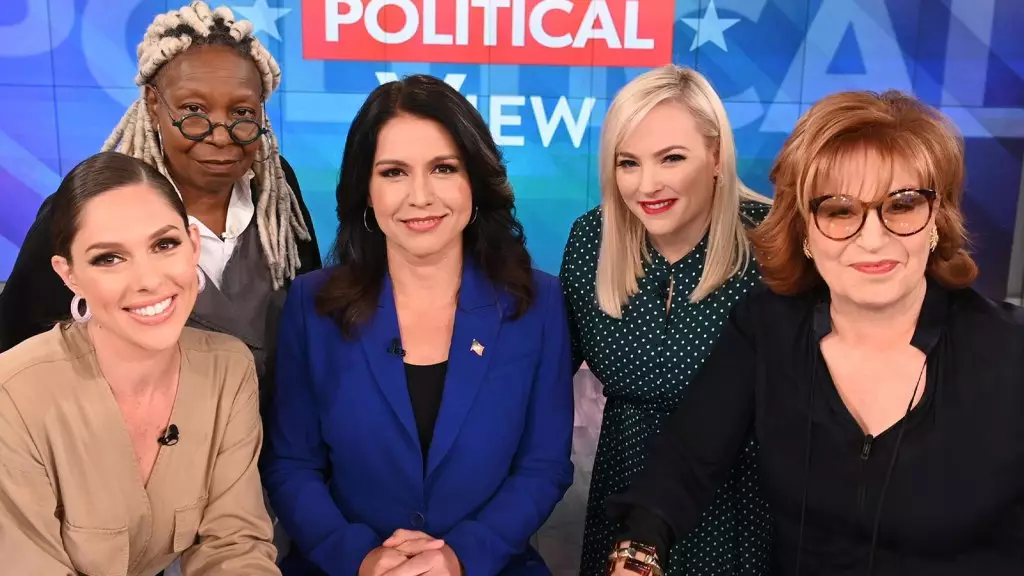Meghan McCain’s departure from The View has not only reshaped the dynamics of the show but also ignited discussions surrounding her controversial tenure and subsequent remarks about her former co-hosts. Recently, McCain publicly reminisced about her friendship with Tulsi Gabbard during the Stand with Women event in Philadelphia, highlighting a sense of camaraderie that contrasts sharply with her experiences on the ABC talk show. This stark juxtaposition raises questions about the nature of authenticity and support within media environments, particularly those driven by political discussions.
At the event, the two women shared a moment reflecting on their history together, starting from their initial encounter on The View in 2019. McCain recalled feeling an overwhelming urge to defend Gabbard from what she described as a predatory panel. Her comments suggest a culture of fear or intimidation prevailing behind the scenes, where differing opinions are not only challenged but often dismantled. McCain’s remarks about her co-hosts being “scared” of Gabbard add a layer of intrigue, insinuating a backdrop of discontent that could resonate with audiences familiar with the show’s often contentious atmosphere.
This narrative unveils the toxicity that can exist in competitive media environments, where individuals may find themselves feeling isolated or under pressure to conform. McCain’s satisfaction in witnessing Gabbard stand her ground against Joy Behar’s questioning speaks volumes about the support networks that can emerge among women in male-dominated political discourse.
McCain’s jabs at her former co-stars have continued well beyond her exit from The View in 2021. Her ongoing commentary underscores a lingering bitterness that has not faded with time. Following incidents where she felt targeted by Ana Navarro and Sara Haines regarding nepotism and public narratives around figures like Dr. Anthony Fauci, McCain’s assertive social media responses have cemented her position as a polarizing figure. “These women will never quit me,” she remarked, indicating that despite leaving the show, she remains very much entangled in its discourse.
This sense of being pursued, or even vilified, speaks to a larger trend wherein public figures often feel compelled to defend their narratives, regardless of their exit from particular spheres of influence. McCain’s feelings echo frustrations harbored by many who find themselves embroiled in a system that often prioritizes sensationalism over nuanced discussion.
Reflections on ‘The View’
The former co-host’s description of The View as a “rigged show” and her derogatory remarks about her former colleagues draw attention to the challenges of working within a public forum that often thrives on conflict. McCain’s experience resonates with those who have faced adversity in the workplace, especially within environments that are meant to foster discourse. Her candid assessment of her time on the show invites contemplation about the implications of media personalities prioritizing entertainment value over genuine dialogue.
Since her departure, McCain has explicitly stated her lack of desire to return to the show, going so far as to declare “not a chance in hell” she would consider rejoining the panel. This firm stance underscores a significant shift in her identity post-View; she is now pursuing opportunities that align more closely with her personal beliefs and values rather than the demands of a corporate media landscape.
Concluding Thoughts
In navigating her post-View landscape, Meghan McCain encapsulates the challenges and complexities of personal authenticity in public life. Her friendship with Tulsi Gabbard highlights the potential for solidarity among women in politics, but her ongoing criticism of her former colleagues reveals deep-seated grievances that warrant attention. As she charts a course away from The View’s structured chaos, her reflections may serve as a broader commentary on the evolving nature of media representation, underscoring the need for supportive environments that prioritize genuine dialogue and meaningful interactions over scripted animosity.

Leave a Reply